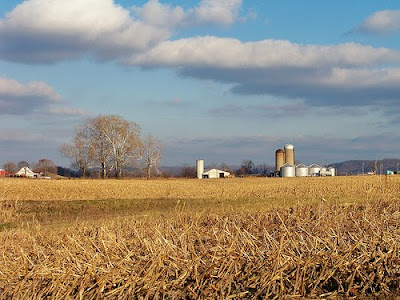 We hear it all the time: farming is 'in crisis'. In Europe, and across the 'developed' world, there is not a day that passes without more reports of farmers going to the brink, even committing suicide out of despair at the state of their industry. It is not unusual to hear farmers cry that this is the worst crisis on the land since the depression of the 1930s. Unfortunately, it isn't getting any better.
We hear it all the time: farming is 'in crisis'. In Europe, and across the 'developed' world, there is not a day that passes without more reports of farmers going to the brink, even committing suicide out of despair at the state of their industry. It is not unusual to hear farmers cry that this is the worst crisis on the land since the depression of the 1930s. Unfortunately, it isn't getting any better.Governments are of no help. The solutions they advanced are a combination of short-termism and defeatism. Give more money to the farmers, in the form of ever-larger subsidies, whilst accepting that, in the long term, traditional farming is doomed, and the only way to go is to engage in an ever-more intensification, combined with 'diversification' for those who don't have the machines, money or land area to rough it out in the new global agricultural market.
At the other end of the equation, mostly in the 'Third World', are peasant subsistence farmers who are finding it difficult to survive whilst their centuries-old farming systems are being undermined by global politics and economics, and who would consider themselves lucky if they produce enough food for their families, let alone generate a surplus for sale.
There is a clear connection between the problems of farmers in the developed and undeveloped worlds. Both are brought by a global trade in agriculture which subsidizes and promotes vast, intensive, capital-rich farmers and destroys everyone else. This approach benefits big 'agribusinesses' and supermarkets, but not the countryside, smaller farmers and the communities that they support. It does not take into consideration the ecological, social and cultural factors necessary to real agriculture. On the contrary, it undermines centuries-old traditional farming practices and drives farmers already in a desperate situation into a vicious circle of technological dependence that further weakens their vital cultural links with the land.
The system that is killing farmers and farming all over the world is a system that regards agriculture as just another industry - a global food factory, subject to the same rules of 'free' trade as car factories or mining. This is a fallacy, but within the current system, it is one which remains virtually unchallenged. For within the current paradigm of global-tradecomes-before-all-else there is, as Margaret Thatcher once famously put it, 'no alternative'.
But there is. And it works.

